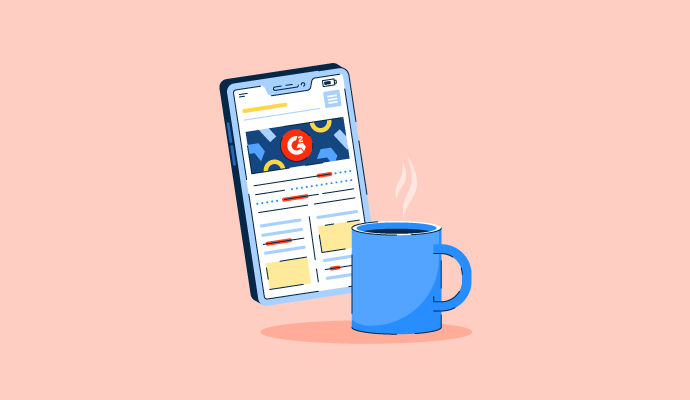April 11, 2025
 by Alexandra Vazquez / April 11, 2025
by Alexandra Vazquez / April 11, 2025

Customer relationships have come a long way since the early days of CRM.
Simple databases have transformed into AI-powered platforms that touch every corner of a business, from sales and marketing to HR and customer success. As companies rely more than ever on CRM tools to drive growth, the question isn’t whether you need one; it’s how to use it right.
As the latest in our Industry Insights series, I chatted with Jon Ferrara, founder and CEO of Nimble and a pioneer in the CRM industry with over 30 years of experience. In our conversation, Jon shares his journey in the industry, how CRMs have evolved, and what AI means for the future of customer relationship management. He also drops some wisdom on what it really takes to be a successful entrepreneur.
To watch the full interview, check out the video below:
This interview is part of G2’s Industry Insights series. For more content like this, subscribe to G2 Tea, a weekly newsletter with SaaS-y news and entertainment.
What is your favorite beverage?
My favorite beverage is Appalachian Spring Water. I live in the mountains here in North Carolina, Western Appalachia, and the water here is just amazing. My body just loves it and I drink it all the time.
What was your first job?
My first job was working on my father's car lot. He had the first Subaru dealership in California back in the seventies. What I learned from it was that I never wanted to work for my dad again, and I never wanted to be in sales. I achieved one of those things: never working for my dad again. But it turned out that even though I shunned his career, it was the learning of my dad's entrepreneurial skills that enabled me to really pioneer CRM, as we know it today, by founding a company called Goldmine back in the day. So thanks, Dad!
What are your best time management hacks?
Write it down. If you don't write it down, you're going to forget about it. We're all human. And in today's short span of attention, we forget things. I think the measure of a human being is saying what they're going to do and doing what they say, so write it down. I like to start my day with a list of the things I want to accomplish that day, and I put it right in front of me and I keep it there until I get it done.
What is your favorite software in your current tech stack?
Well, I think relationships are key to life success. And they say that your network is your net worth. And so, my favorite piece of my tech stack is Nimble. Why? Because it helps me manage the overconnected network that we’ve all become a part of in today's social tech world. As Mae West said, “Out of sight is out of mind, and out of mind is out of money, honey.”
What problems or issues at work make you want to throw your laptop out the window?
I’d say when the Internet's down. But that's too easy, right? I think one of the hardest parts of a job is the human aspects because human beings do the darndest things, and sometimes they can really frustrate you. But I try to lean into those frustrations.
When I feel discomfort with a team member, I lean into it and ask them an open-ended question like, “How are you doing? Tell me what's going on.” Then I shut up and let them go. I think we all want to be heard, and we all want to be in an environment where we feel safe. I try to create that environment with my team and let them get stuff off their chest.
Tell us a bit about yourself. What drew you to the world of CRM?
There are a couple of things that really affected my trajectory. My mom put me on an airplane and flew me to New York City when I was 9 years old, and on that trip, I went to the Pan Am building, which now is the Metlife building. There was a computer terminal in the lobby. And I went and touched it, and it changed my life. It was an IBM Selectric running Eliza, which is an AI program that is like a therapist. It interacted with me in a human way that was huge in 1979. That made me want to pour myself into technology growing up.
My dad's car lot taught me a lot about relationships and the power of connection. My dad was a people person, and I became him. That combination of things put me on a path to being technical.
In 1986 and 1987, there was no CRM automation tool. You had a spreadsheet for your forecast and a calendar where you put your appointments. That's how I ran my life. I got pieces of paper with names of people in big corporations, and that's called a lead. I would cold call them, make notes on the paper, put my forecast in the spreadsheet, and communicate them with my team. One day I said, “This is so stupid.”
I looked around for a program that would run a wire through all of our tape timers so everybody was on one page. I knew it was more than me that was touching the customer. There was sales and marketing, support management, shipping, PR, etc. I wanted to run a wire through all of our contacts so that no matter who picked up the phone, you knew who you were talking to. It didn't exist. There was no Outlook, there was no Salesforce, there was no Hubspot, there was nothing.
So, I started a company called Goldmine. Goldmine started on $5,000, never took a dime of venture capital, and grew to north of 100 million dollars a year in revenue, which was real money in the 90s. We basically pioneered contact management CRM and market automation because I trademarked these automated processes 35 years ago.
The most important thing we pioneered at Goldmine was contact management because that's the heart of a business. Now, today, email productivity suites give every team member a separate contact database. That means you don't have a relationship manager for the whole company. What you have, maybe, is a CRM for salespeople, an accounting program for the accountants, and an email marketing tool for your marketers. But you don't have a single record of the relationships that your business deals with, and that is contact management. And that's really what we pioneered at Goldmine, and that's the heart of Nimble: a team relationship manager for the whole company.
How does Nimble differentiate itself from other CRMs in the market?
I think there's got to be a hundred bazillion CRMs out there. The funny thing is that when I started, there was really only one or two. And today, there's a million or so.
What differentiates Nimble is that every other CRM is mainly designed for salespeople. However, salespeople make up less than 5% of any company and, in most cases, even less. Nimble is a CRM for the whole company, not just salespeople.
Today, a CRM tool is also designed for management reporting, and not just salesperson engagement. That's why when you buy a CRM like Salesforce, you have to buy Outreach.io or Salesloft as the outreach tool for your sales reps. Then, you have to buy ZoomInfo as the lead enrichment tool. Then you have to make sure all that stuff can talk to each other and have sales reps smart enough to use it. If they’re not, you have to hire a sales administrator to run all that stuff. Nobody in their right mind would use a CRM if they weren't forced to because they're not designed for engagement. And that's because CRM forgot contact management. They forgot the R in the relationship part.
The whole outcome of a CRM is basically a deal. There are 225 million global businesses, and less than 1% use a CRM because they are not really designed for relationships. Most people's relationship manager is a spreadsheet, which is awful because spreadsheets are static.
Nimble is designed to enable you to manage processes other than deal workflows. And it's a relationship-focused CRM, so it's really designed to empower the customer-facing business team members to engage more effectively.
What are the most significant changes you've seen in how businesses use CRMs to manage customer relationships over the last 30 years?
That actually reflects back to one of the big problems I’ve had. People don't really know what CRM tools are for. Before you go buy a business application, think about what you want it for. Applications are a box. You put things in, and you get things out. You should define that before you ever embark on getting a CRM tool.
CRM systems are effectively a database. How has that changed over time? It's become more sophisticated. Today, it's web lead capture. The CRM tool becomes the heart of a business.

Every Thursday, we spill hot takes, insider knowledge, and news recaps straight to your inbox. Subscribe here
Business applications come in two categories: front office and back office. The front office is sales and marketing, and the back office is accounting. Ideally, your CRMs tie into all of that.
Small businesses are also looking to behave like big businesses without all the costs and complexities. And that's one of the reasons why we have integrated email marketing with the sales enablement stuff.
Lastly, I think that software has gotten too complex and expensive. There are too many components necessary to build a proper tech stack. One of the reasons why we built Nimble is to fix that.
Having founded and scaled two global companies, what are the biggest lessons you’ve learned about entrepreneurship?
It's easy to give up. It's harder to stay the course. Staying the course is what delivers the rewards, but it's hard. There were so many days at Goldmine that I just wanted to cry. If it was easy, everybody would be doing it. I think there are certain people that have a calling, and I have the calling.
In the brief period of time that I'm going to be on this planet, I want to grow my soul. The best way for me to grow my soul is by helping other people grow theirs. My gift to other people is helping them build relationships and achieve their dreams. Ideally, their dreams involve helping others. And then you just recursively rinse and repeat. So I'm trying to create a better world by improving myself and improving others so they can improve others, so the world's a better place.
I believe that relationships are critical to life success, but most people don't manage them well. I believe that everybody should have a personal CRM tool. You’re not going to work at the same company your whole life. But the people that you've met doing the job are going to be the network that's going to allow you to achieve your dreams. So everybody should have a personal CRM tool and bring it to work with them.
I have a formula for setting a course for entrepreneurship. It's called the 3 Ps: passion, plan, and purpose. Figure out what your passion is, build a plan to achieve it, and make it your purpose daily. Take that plan and stick it on your mirror or your refrigerator, and every day, determine what you are going to do to get one step closer, no matter how hard it gets.
What role do you see AI playing in the future of CRM platforms?
I think that we all know what we should do, but we don't do it because it's a lot of work. AI can make things easier. AI can scan a contact's background and scan your background to help you communicate more effectively.
I think the mistake salespeople make is they talk too much about themselves, their company, and their products. People don't buy great products; they buy better versions of themselves. So when you're communicating with another human being, you should have done your work to know enough about them, their business, their background, and their goals to sell that person a better version of themselves. Most people don't do that, but AI can help you to do that.
I don't think you should use AI and automation to bother people because people are tired. Don’t annoy people with a bunch of automated emails that are written by some cutesy AI that doesn't really address who you're communicating with and what their business is about.
Your job as a salesperson is not to make as much money as you can but to help as many people as you can outgrow and achieve their dreams. Zig Ziglar said it best, "You will get all you want in life if you help enough other people get what they want.”
People can recognize AI in things. The human brain is more spectacular than we could ever fathom. So, I think for you to stand out from the crowd, you should use AI. But you should be careful not to overuse it because I really believe that humanness in the age of AI will help us set ourselves apart. Don't fear AI, embrace it. But make sure you're not using it in a way that it's robbing you of your humanness.
Watch the full chat on YouTube and subscribe to G2 Tea, our SaaS-y newsletter with tech insights and tidbits from industry professionals like Jon!
Follow Jon Ferrara on Linkedin to learn more about his extensive knowledge in the industry and how he is pushing the boundaries of what's possible with customer relationship management.
Edited by Supanna Das
Alexandra Vazquez is a former Senior Content Marketing Specialist at G2. She received her Business Administration degree from Florida International University and is a published playwright. Alexandra's expertise lies in copywriting for the G2 Tea newsletter, interviewing experts in the Industry Insights blog and video series, and leading our internal thought leadership blog series, G2 Voices. In her spare time, she enjoys collecting board games, playing karaoke, and watching trashy reality TV.
Most sales outreach fails. Not because reps aren’t trying hard enough, but because they’re...
 by Alexandra Vazquez
by Alexandra Vazquez
SEO is no longer what it used to be.
 by Alexandra Vazquez
by Alexandra Vazquez
In the rush to embrace AI, many companies are sprinting toward adoption without a clear...
 by Alexandra Vazquez
by Alexandra Vazquez
Most sales outreach fails. Not because reps aren’t trying hard enough, but because they’re...
 by Alexandra Vazquez
by Alexandra Vazquez
SEO is no longer what it used to be.
 by Alexandra Vazquez
by Alexandra Vazquez


